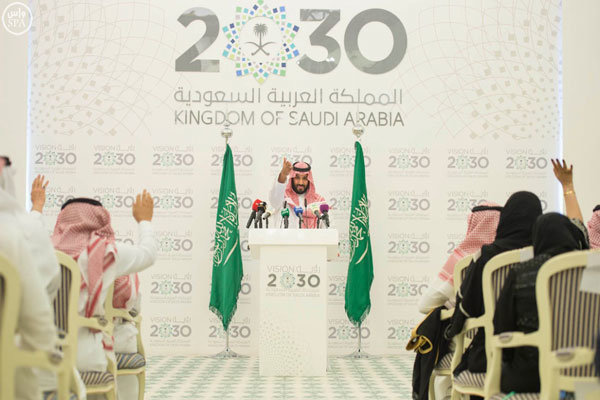Saudi efforts to 'modernize' economy away from oil are just PR tactics

Just like his adventure in Yemen, Saudi Arabia’s young Deputy Crown Prince Mohamed bin Salman got it all wrong last week. It’s not Saudi Arabia which suffers from “oil addiction”, it’s we who are addicted. The unique Saudi drug – a cocktail of wealth, arrogance and infantile Puritanism – is far more dangerous, since it depends on the arithmetic (or myth) of its 716 billion barrels of oil reserves.
If this statistic is as ill-conceived as the Sunni Saudi war on Yemen’s Shia Houthis, along with its massive civilian casualties, then Prince Mohamed’s ‘reforms’ – oiled (if that’s the right word) by a $2 trillion public investment fund which would take over ownership of the state oil company Aramco – will have to kick in long before the deadline of his ‘Vision 2030’.
For years, oil analysts have suggested that Saudi reserves are nothing like the kingdom claims them to be – a suggestion which became far more disturbing when Wikileaks disclosed last year that the U.S. embassy in Riyadh had warned Washington that Saudi reserves could be 40 per cent less than we were led to believe.
Inaccurate statements
The source was Sadad al-Husseini, the former head of exploration at Aramco. He later angrily explained that he’d been misrepresented by the American diplomats whose note, already at least six years old, contained “many patently inaccurate statements”. But back in 2004, oil analysts such as banker Matthew Simmons, after studying 200 technical papers on Saudi reserves, were saying that the country’s oil was “peaking”, its oil fields already damaged by using salt water to maintain pressure.
These rumors were only reinforced by Saudi Arabia’s refusal to reveal any details of their reserves. Thus, Prince Mohamed’s promise that a privatization of Aramco would increase transparency and limit corruption will be viewed with the usual skepticism.
More than 30 years ago, the Sunday Times was taken in by Saudi claims of imminent reforms – inviting foreign journalists to the country to learn of striking changes has long been a Saudi routine – but even then reporters spotted the real problems of Riyadh and other Persian Gulf capitals.
How can we believe in the massive planned changes in the social structures of Saudi Arabia, its emergence as a global investment power, when its monarchy is locked into eternal marriage with the same crude Wahhabi faith practiced by the Taliban, al-Qaeda and ISIL?
welfare stateism
Martin Woollacott, one of my early heroes in the trade of reporting, wrote in 1981 that what he called “welfare stateism” in the region was producing a class of people “that is losing sight of the relationship between work and reward that is incipiently anti-foreign… It is wide open for an ideology which would purge it of its unease and guilt without materially reducing its privileges. The youth of this alienated middle class and confused, if materially comfortable, working class is already showing signs of going in the most likely direction – toward political Islam.”
Woollacott, let us remember, was writing before the Taliban, before al-Qaeda, 20 years before 9/11 and its 15 Saudi hijackers – and 33 years before the emergence of ISIL. And this, of course, was what was missing from Prince Mohamed’s triumphalism last week.
How can we believe in the massive planned changes in the social structures of Saudi Arabia, its emergence as a global investment power, when its monarchy is locked into eternal marriage with the same crude Wahhabi faith practiced by the Taliban, al-Qaeda and ISIL?
How can we listen to the good Prince saying that “we will not allow our country ever to be at the mercy of commodity price volatility or external markets” when Saudi Arabia is, in truth, at the mercy of an army of head-chopping, anti-Shia puritans who support the assault on Yemen (which, with eight other nations in tow but with futile inappropriateness, was code-named “Operation Decisive Storm”), and regularly express their loathing of Iran, Syria, and many of the Shia Muslims in Lebanon?
No wonder, as the Washington Post revealed this month, the Saudis are spending millions on Washington’s top law, lobby and public relations companies to promote foreign investment in the Saudi economy – some of them, according to the paper, “tasked with coming up with content for the [Saudi Washington] embassy’s official Twitter and YouTube accounts”. The PR firm Qorvis, it turned out, also ran the Twitter account for the Syrian Opposition Coalition. Firms like Podesta, BGR Government Affairs, DLA Piper and Pillsbury Winthrop are trying to raise the Kingdom’s “visibility”.
Free riders
After threats to release the missing – or “redacted” – pages of the 9/11 report, Barack Obama’s snotty criticism of Persian Gulf “free riders” in his Atlantic magazine interview, and the Clinton-Sanders support for U.S. families who want to sue foreign governments like Saudi Arabia for 9/11, these PR firms have a lot of work to do – and a lot of money to make.
Interestingly, the Podesta Group – with a $140,000 monthly contract with the Centre for Studies and Media Affairs at the Saudi Royal Court, was founded by Tony Podesta, a Democratic lobbyist and major contributor to La Clinton herself.
And all this without mentioning that oil still floats away from the Persian Gulf at scarcely $35 a barrel. Or about the unchanging and absolute nature of the Saudi monarchy. Or about Saudi education reform or tax revenue. Or about a Saudi woman’s right to drive a car. Or about the decapitations that the Saudis still inflict on those who trade in drugs.
But not on those, of course, who suffer from that most dangerous of narcotics: oil addiction.
(Source: Independent)
